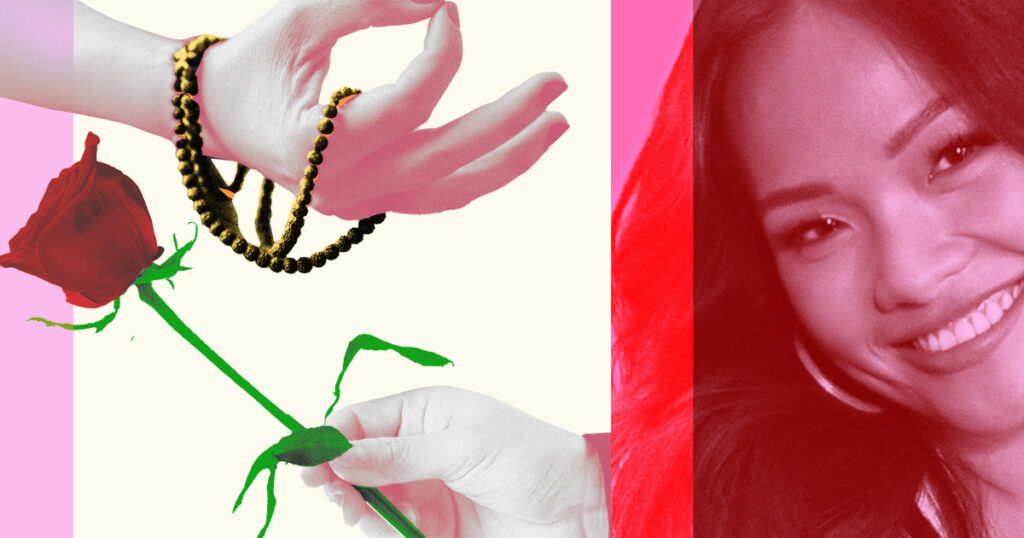This season of “The Bachelorette” requires more than just chemistry to win a rose: Lead star Jenn Tran is also banking on religious chemistry.
In a recent episode, Tran told contestants that she ultimately wants to inculcate her own children in the Buddhist faith, the religion she was taught growing up in a Vietnamese-American family in New Jersey.
“There are a lot of traditions there that I want to incorporate into my family,” Tran told contestant Devin Strader in Episode 4. “We go to the temple every year for Lunar New Year and other holidays, and I want to instill that in my kids.”
While much has been said about the growing racial diversity in “The Bachelor” franchise, fans say they’re excited to finally see religious diversity as well.
This season has devoted a surprising amount of airtime to Tran’s Buddhist faith and the religious upbringings of the Jewish contestants, which some have found refreshing — all things that critics say have been avoided in the past because of the show’s largely white Christian fanbase.
Her openness about her religious identity encouraged her suitors to also reveal their own religious identities.
Devin, Jen Tran, Jeremy. ABC
During a one-on-one date with contestant Jeremy Simon on last Monday’s episode, Simon expressed his desire to one day raise children within Jewish culture. He told Tran, “Being Jewish is very important to me culturally. I’m not expecting to convert, and I don’t have to convert, but I would like to have children eventually, and I think having a Jewish identity is very important to me.” [is important] Because of what happened to the Jews in the past.”
In response, Tran told Simon that Buddhism is something she doesn’t want to give up: “I love my faith, and I want my mother to teach it to my children.”
And the fans say they’re here expecting that.
Viewer Sam Mandel, 33, who is half Taiwanese and half Jewish, told NBC News he could see himself in both Tran and Simon on screen and appreciated how they expressed how important their religions are to them.
“It was very special to see members of two minority religious groups talking about respecting and integrating their cultures. There was an understanding of the need to preserve cultural and communal ties that members of the dominant religious group may not understand.”
Emma Gray, podcast co-host
“I grew up celebrating both Jewish and Buddhist holidays,” says Mandel, a native of Portland, Oregon. “I loved hearing about coexisting in healthy relationships while still maintaining the parts of yourself that matter.”
Emma Gray, co-host of the pop culture podcast “Love to See It,” said she thought it was significant that the show would include Judaism and Buddhism. Gray, who is Jewish, said showmakers have historically avoided explicit discussion of religion because they thought it would alienate viewers, and that any mention of religious identity has focused only on evangelical Christianity. A representative for ABC declined to comment.
“It was very special to see members of two minority religious groups talking about respecting and integrating their respective cultures,” said Gray, who is also a columnist for MSNBC. “There was an understanding of the need to preserve cultural and communal ties that members of the dominant religious group may not understand.”
Podcast listeners shared the exchange between Tran and Simon on TikTok, with one viewer commenting, “As a Taiwanese Jew who grew up with both Buddhist and Jewish influences and values, we have a lot in common, which is beautiful and can definitely work if both sides are respectful and open.”
The show has featured a range of religions in the past, including Bachelor stars Jason Mesnick, who identified as Jewish in 2009, season 13’s bachelor, and Andi Dorfman, who was season 10’s bachelorette in 2014.
During season 27 of “The Bachelor,” Zach Shallcross met with contestant Arielle Frenkel’s family in New York City, where she took him to a kosher restaurant and discussed the importance of faith.
In the first season of the 2023 “Golden Bachelor” spinoff show, contestant Leslie Fima and several other contestants are seen dancing the hora in a pool and singing “Hava Nagila,” a Hebrew song traditionally sung during celebrations.
Gray said these couples are an accurate reflection of what it means to date in a country where interfaith marriages are on the rise. “It just reflects reality,” she said. “People are dating across religious, ethnic and racial boundaries and meeting people from different backgrounds.”
But she emphasized that Tran’s representation has larger implications that go beyond religion: “We see someone like Jen, who is not part of a predominantly white Christian culture, as worthy of being seen and considered desirable by a diverse population,” Gray said.
For more updates from NBC Asian America, sign up for our weekly newsletter.




1 Comment
Muchas gracias. ?Como puedo iniciar sesion?